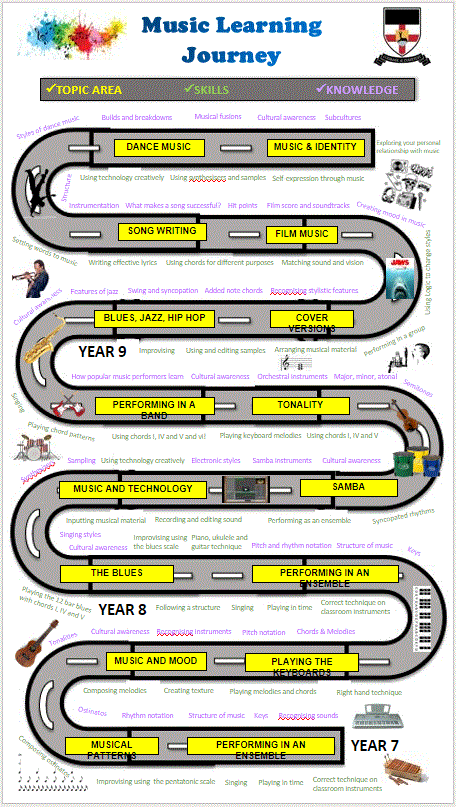Mathematics - Year 7
Click here to return to our Music curriculum home page
Below you will find more specific information about the curriculum in Music for Year 8 students, explaining to you what students will learn, when, why and how. There is also information about how parents/carers are able to support students in their learning, extra-curricular opportunities in this subject and how it links to other subjects and the wider world.
|
Subject Key Concepts #1 Singing#2 Composing#3 Improvising#4 Performing#5 Critical Engagement#6 Technology#7 Spiritual, Moral, Social and Cultural
|
Curriculum Overview for the Year
|
Useful documents:
Please click here for a PDF of curriculum overview.
While this information covers a broad range of areas, please do get in touch with the Subject Leader Mr Byers if you have any questions.
Please click on the questions below to find out more.
How are groups organised?
We organise our classes by mixed ability. The students have one lesson per week. They alternate working between our computer suite (K2) and our music classrooms (K1/3), swapping each half term.
What characteristics does a successful student have in this subject?
The most successful students in this subject will enjoy working practically and creatively. They will listen to a wide range of musical styles and be keen to work independently as well as in pairs and groups. They may also enjoy some or all of the following aspects of music making:
- - creating music using our music software programme; Garageband
- - playing an instrument
- - singing
- - writing and/or recording their own music
How will students learn at this level?
- Practising
- Paired/group collaboration
- Listening tasks which help to embed vocabulary and key concepts
- Trial and error when experimenting with different musical ideas
- Peer and teacher constructive feedback tasks/discussion
- Observing your peers
- Watching practical demonstrations
- Use of the internet to research African music and PowerPoint/google slides/word to present findings
- Use of music software programmes
How will students’ learning be assessed at this level?
Continued monitoring of progress through informal observations and listening task results. Composition/performance work is recorded and assessed at the end of each project.
There is also a short end of year listening test based on the topics covered.
When do key assessments take place?
End of topic assessments each half term.
Listening test in June.
How can parents/carers support students’ learning?
- Listen to a wide range of different types of music e.g. from different parts of the world, different decades, different styles. Perhaps listen together in the car or make use sites such as youtube.
- Discuss what you can hear e.g. instruments, mood
- If you have an instrument, give time and space for the student to experiment at home (peripatetic lessons are available if desired)
- Ask the student about their music work
- Download/purchase some music software (there are some free programmes available). NOTE: This is optional, not a requirement.
What equipment do students need for this subject?
Essential school equipment.
If the students play an instrument there will be lessons where they can use it as part of the classwork.
How does this subject link to other subjects?
What websites or resources may be helpful to support students’ learning?
What extra-curricular or enrichment opportunities are available for students in this subject at this level?
What sort of careers can this subject lead to?
What does student work look like in this subject at this level?
How does this subject support a broad and balanced curriculum, meeting the needs of all students, and developing traditional core skills?
How does this subject promote creativity, critical thinking, practice, perseverance and resilience, and making links?







